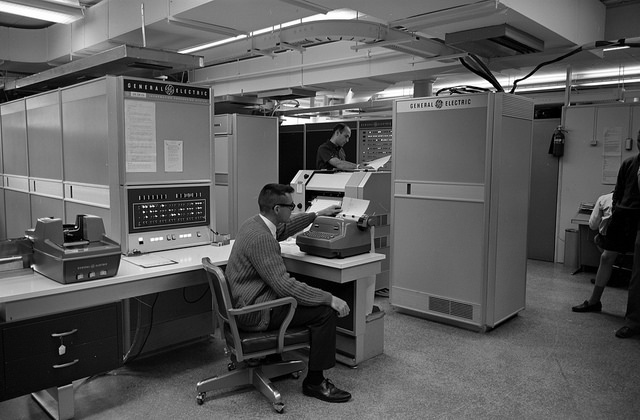A programming language familiar to all, BASIC, has turns 50 years old. This month, BASIC celebrates an anniversary reached by very few languages: 50 years of continuous use. Basic Turns 50 article looks back on 50 years of attracting (and repelling) new programmers. It’s difficult to imagine the computing world in 1964. There were no PCs, nor even minicomputers, and networking was for all practical purposes nonexistent. Programming was done on mainframes that could support remote teletype machines over telephone lines. BASIC took off and hit its stride in the ’70s and especially the ’80s, when it became the de facto language for PC programming. It was the language that Microsoft rode to fame and fortune.
The computer that the people at Dartmouth started BASIC 50 years ago and they have a description of the beginning on Basic at 50 page: At 4 a.m. on May 1, 1964, in the basement of College Hall, Professor John Kemeny and a student programmer simultaneously typed RUN on neighboring terminals. When they both got back correct answers to their simple programs, time-sharing and BASIC were born. This year, Dartmouth is celebrating 50 years of BASIC, and the celebration is today Wednesday, April 30. For more historical details check also Basic Programming Language is 50 Years Old article.

This photo was taken shortly after the first simultaneous execution of two BASIC programs in 1964. Image credits credit go to Dartmouth College that gave permission to use this picture from Historic BASIC images on Flickr.

2 Comments
Tomi Engdahl says:
10 PRINT “Happy 50th Birthday, BASIC” : GOTO 10
Language that defined the 8-bit era celebrates half a century
http://www.theregister.co.uk/2014/05/01/basic_50th_anniversary/
Wanna feel old? Thursday marks the fiftieth anniversary of the invention of BASIC, the programming language that took the computing world by storm during the PC revolution of the mid-1970s and 1980s.
A version of BASIC shipped with practically every home computer of the era, but the language actually dates back to 1964, when computer boffins John Kemeny and Thomas Kurtz ran the first successful BASIC program on May 1 at 4am.
BASIC interpreters were Microsoft’s core business into the early 1980s, before MS-DOS became an even bigger cash cow. Microsoft supplied the Applesoft BASIC interpreter for the wildly popular Apple II line of home computers, and many of Apple’s competitors at the time also licensed Redmond’s code, including Atari, Commodore, and Tandy/Radio Shack.
The language became so popular during this period that a BASIC interpreter was virtually a requirement for any home computer. Companies that didn’t license Microsoft’s version created their own, resulting in such dialects as BBC BASIC and Sinclair BASIC in the UK.
Tomi Engdahl says:
Fifty Years of BASIC, the Programming Language That Made Computers Personal
http://time.com/69316/basic/
Knowing how to program a computer is good for you, and it’s a shame more people don’t learn to do it.
For years now, that’s been a hugely popular stance. It’s led to educational initiatives as effortless sounding as the Hour of Code (offered by Code.org) and as obviously ambitious as Code Year (spearheaded by Codecademy).
Even President Obama has chimed in.
I find the “everybody should learn to code” movement laudable. And yet it also leaves me wistful, even melancholy. Once upon a time, knowing how to use a computer was virtually synonymous with knowing how to program one. And the thing that made it possible was a programming language called BASIC.